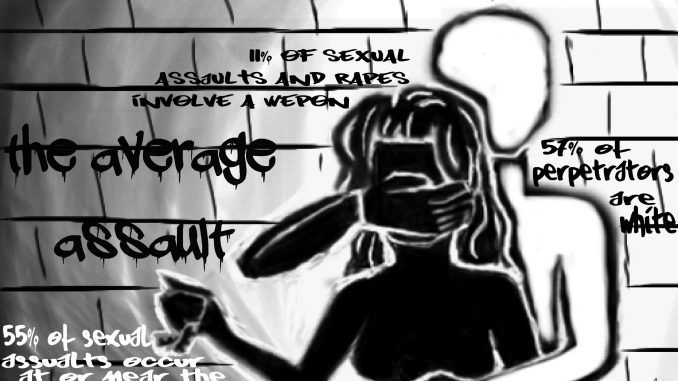
About 1.8 million adolescents in the United States have been victims of sexual assault, according to the U.S Department of Justice’s National Sex Offender Public Website (NSOPW).
Although young men can also experience sexual assault, it is more likely to happen to young teenage girls. Ninety-one percent of the victims of rape and sexual assault are female, and 9 percent are male. Girls all over the country are in danger, especially high school and college students. e NSOPW says that 1 in 5 female high school students report being sexually abused by a dating partner. According to the Rape Abuse and Incest National Network, females ages 16-19 are four times more likely than the general population to be victims of rape, attempted rape, or sexual assault.
What exactly is being done about this? Not much.
This is a huge problem that is not getting enough attention. A study by the National Research Council says that 80 percent of sexual assaults go unreported. is means that people are being sexually assaulted and it is not known because victims are too scared to speak out. Many of these cases go unreported because a lot of times sexual assault cases seem to go nowhere, therefore people don’t find the courage to speak up. There has been little or no change in the rates of prosecution of rape in the last two decades, and a lack of prosecution allows serial rapists to run free, according to the Rape Response Services National Statistics Organization.
It is important for a sexual assault victim to get help and speak up. Most of the time victims feel like it’s somehow their fault that the rape happened, but that is not true. Also, some victims don’t know if it was rape or not. A rape victim might be manipulated by a partner or be too drunk to remember. Either way, it’s still sexual assault. If a person says “no” or isn’t capable of coherently consenting to sex, yet the other person forces sex on them, rape has occurred under the law. Incapacitated people are unable to consent to sex, whether they are drunk, have taken prescription or illegal drugs, or are developmentally disabled, according to most state laws.
A sexual assault victim/survivor may have some of the following feelings: anger, fear, guilt, loss of control, powerlessness, embarrassment, depression, isolation, denial, shame, disbelief, self-blame and emotional shock. A victim has the right to feel all of this, but it is in no way their fault. Reach out for help. Not everyone has to know. A victim has a right to privacy and they have to be treated with respect and dignity.
Many people, especially teenage girls are scared be- cause they feel like they won’t be heard or people will speak bad about them. However, a victim shouldn’t doubt herself. No one has the right to judge a victim of sexual assault. It’s okay to be scared, but every vic- tim deserves to be heard. It is important to con de in a loved one or in someone who will help you.
No one should have to go through this alone.
If you are a victim of rape, seek medical attention immediately. Don’t be afraid to go to the authorities. What if the person who hurt you, hurts someone else? It’s not only up to rape victims to speak up but also to the people around them to help them and make sure they’re okay. If you know of someone who is being sexually abused, then tell someone who will help immediately. Help and support are all around.
For an immediate emergency, dial 9-1-1. For supportive counseling, practical information about crime and victimization dial the National Center for Victims of Crime by phone at (800) 394-2255. For more support and information go to the National Sex Offender Public Website or www.NSOPW.org

